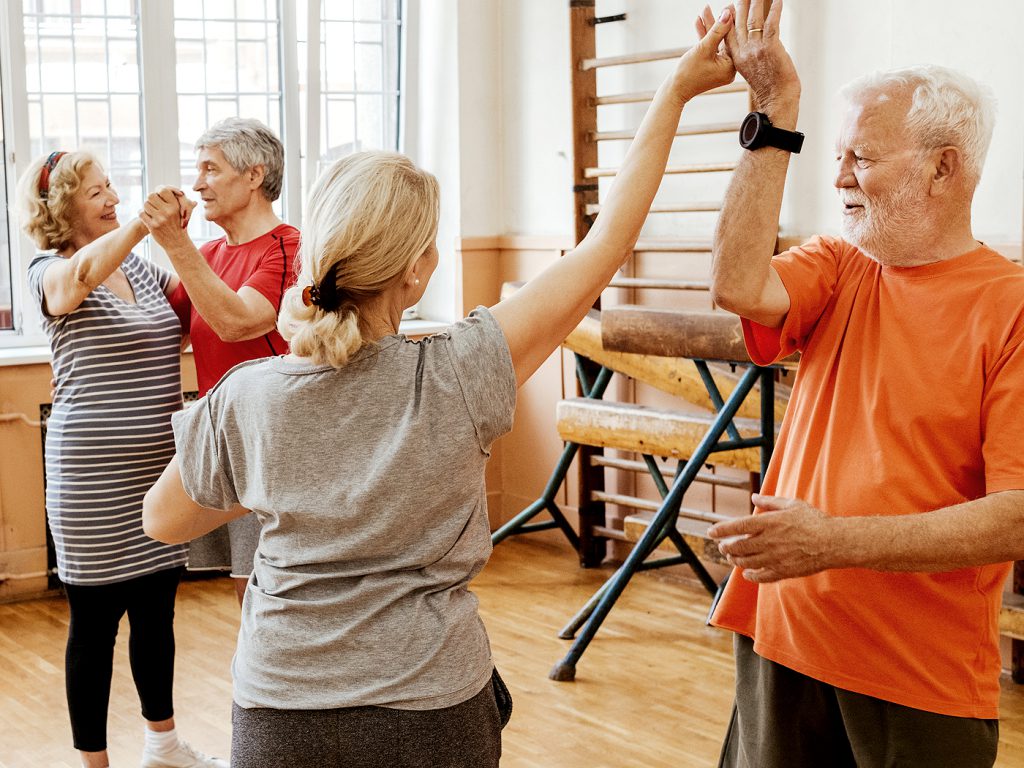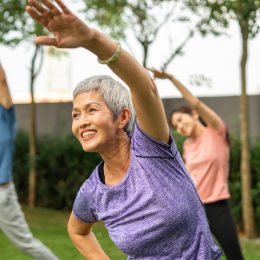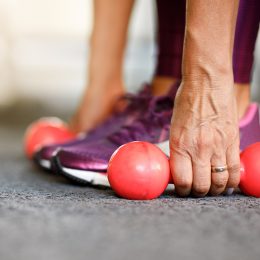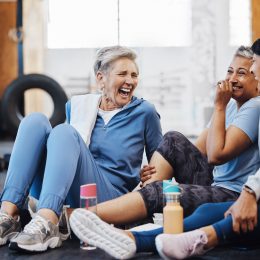The Beginner’s Guide to Dance Cardio Fitness
This modern twist on aerobics comes with some serious mind-body benefits—no leotards, leg warmers, or dance experience required.

Picture this: A great song comes on, and you start humming along, maybe tapping your feet. Soon you’re dancing in your chair or strutting around the room. Your mood instantly lifts as you find your groove. It sounds like fun, but not a lot like exercise, right? Wrong!
The same effective workout that you may have known as aerobics now appears on group fitness schedules under a wide variety of names, but the common thread is that they’re all based on choreographed movements set to music.
Often called “dance cardio” or “dance fitness,” these updated aerobics classes are a fun way to get moving while also improving balance and coordination, reducing stress, and boosting your overall fitness level. Plus, research shows that dance-based exercise can help older adults preserve the ability to perform normal daily activities on their own, like standing up from a chair. And one study published in the New England Journal of Medicine found that dancing is associated with a reduced risk of dementia.
Ready to try dance fitness for your body and mind? Here ’s how you can take advantage in an exercise class or at home.
What to Expect at a Dance Cardio Class
If you take a dance fitness class at your gym or local community center, the instructor will provide the music and the how-to for safe, low-impact movements. You simply bring your enthusiasm and determination.
“You should feel comfortable dancing and feel inspired to do your own thing—not compared to anyone else,” says SilverSneakers 2017 Instructor of the Year finalist Donna Culley, a certified group fitness trainer at YouFit Health Club in Midlothian, Virginia. “Anything that gets you moving is a great opportunity for you to stay healthy.” So go ahead and dance like you mean it!
Culley, like most SilverSneakers instructors, tailors her classes to all levels, including newbies. After a sensible warmup, she leads students through a modern mix of movements. “I encourage you to push yourself in a healthy way, and if you have to scale back with modifications, that’s perfectly fine, too,” she says. “Opportunities to progress are always there, and you can choose to move more gracefully or power up and go the distance.”
These four SilverSneakers classes are a great place to start. Start by checking your eligibility and finding a location, and then check these out.
1. SilverSneakers Classic
This beginner-friendly class includes a variety of low-impact exercises designed to increase muscle strength and range of motion—all set to motivating music. A chair is used for seated exercises as well as support for standing movements.
2. SilverSneakers Circuit
This workout alternates standing, low-impact choreography with standing strength exercises. It’s a little more intense than Classic, but still suitable for most fitness levels.
3. SilverSneakers CardioFit
This high-energy aerobics class uses low-impact movements that focus specifically on building upper-body and core strength plus cardio endurance. It’s higher intensity than Classic and Circuit, with no sitting for the entire 45 to 60 minutes.
4. Boom Move It
This 30-minute class is all about burning calories and having fun. You’ll start with simple dance moves then step into more complex sequences that build both stamina and strength. If you’ve ever dreamed of appearing on So You Think You Can Dance, this class is for you.
Can’t Get to a Class? Try These Moves at Home
If you’re unable to take a class, you can still reap the benefits of dance fitness. “Just put on some music and get moving,” Culley says. More specifically, try these three dance-inspired exercises.
1. Seated Crunches with Mini-Exercise Ball
Your hips move like a door hinge in this exercise. Sit in a chair and position an eight- or nine-inch exercise ball behind you, between the chair and your sacrum—that big bone at the base of your lumbar spine. Gaze forward as you inhale deeply, tightening your abdominal muscles and sitting up tall in the chair to lengthen your spine. Place hands on your shoulders.
Subscribe to our newsletter
It's quick and easy. You could be one of the 13 million people who are eligible.
Already a member? Click to discover our 15,000+ participating locations.
Follow Us
From here, slowly exhale as you lean forward, trying to keep your back straight and maintaining your forward gaze. Bring your hands to the tops of your knees. Hold for two seconds, then inhale as you return to your original upright position. That’s one rep. Do three sets of 10 reps.
2. Knee Lifts or Standing Crunches
Stand tall next to a chair, holding onto the back for support. With your feet hip-width apart, lift your right foot off the floor, pulling your right knee up toward your chest while drawing your belly in toward your spine. Hold two counts, then lower your foot. Repeat on the other side. Do this 10 times on each side.
For a higher degree of difficulty, eliminate the chair, and gently swing your arms back and forth. When your right knee comes up, so does your left arm—as if you’re marching grandly in place.
3. Step to It
Start by marching in place for a few counts, and then bring out your inner choreographer. Take two steps to the right as you swing your right arm in a complete circle. Imagine you’re tracing a rainbow from end to end.
Now, take two steps to the left as you swing your left arm in a circle. Feel free to add a step or two on each side, keeping the number of steps on each side the same.
Don’t worry if you don’t have it perfect, Culley says. “Just remember your body really is meant to move.”





